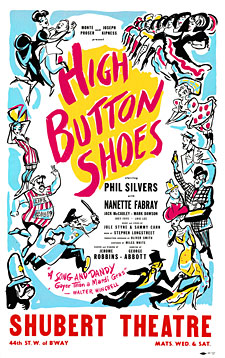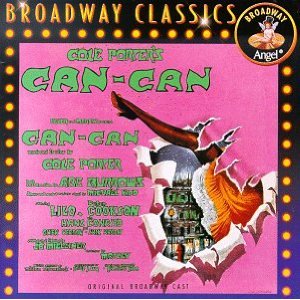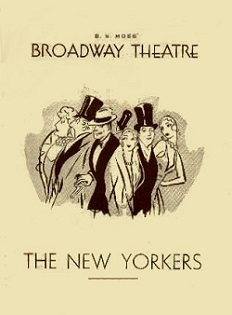
Anyone Can Whistle is a musical with music and lyrics by Stephen Sondheim, and a book by Arthur Laurents. Described as "a satire on conformity and the insanity of the so-called sane," the show tells a story of an economically depressed town whose corrupt mayor decides to create a fake miracle in order to attract tourists. The phony miracle draws the attention of an emotionally inhibited nurse, a crowd of inmates from a local asylum, and a doctor with secrets of his own.

Follies is a musical with music and lyrics by Stephen Sondheim and a book by James Goldman.

Gypsy: A Musical Fable is a musical with music by Jule Styne, lyrics by Stephen Sondheim, and a book by Arthur Laurents. It is loosely based on the 1957 memoirs of striptease artist Gypsy Rose Lee, and focuses on her mother, Rose, whose name has become synonymous with "the ultimate show business mother." It follows the dreams and efforts of Rose to raise two daughters to perform onstage and casts an affectionate eye on the hardships of show business life. The character of Louise is based on Lee, and the character of June is based on Lee's sister, the actress June Havoc.

High Button Shoes is a 1947 musical with music by Jule Styne, lyrics by Sammy Cahn and book by George Abbott and Stephen Longstreet. It was based on the semi-autobiographical 1946 novel The Sisters Liked Them Handsome by Stephen Longstreet. The story concerns the comic entanglements of the Longstreet family with two con men in Atlantic City.

Panama Hattie is a 1940 American musical with music and lyrics by Cole Porter and book by Herbert Fields and B. G. DeSylva. The musical is about a nightclub owner, Hattie Maloney, who lives in the Panama Canal Zone and ends up dealing with both romantic and military intrigue. The title is a play on words, referring to the popular Panama hat.

William John Eythe was an American actor of film, radio, television and stage.

Me and Juliet is a musical with music by Richard Rodgers, and lyrics and book by Oscar Hammerstein II. The sixth stage collaboration by Rodgers & Hammerstein, it tells a story of romance backstage at a long-running musical: assistant stage manager Larry woos chorus girl Jeanie behind the back of her electrician boyfriend, Bob. Me and Juliet premiered in 1953 and was considered a modest success — it ran for much of a year on Broadway and had a limited run in Chicago, and returned a small profit to its backers.

Can-Can is a musical with music and lyrics by Cole Porter, and a book by Abe Burrows. The story concerns the showgirls of the Montmartre dance halls during the 1890s.

Allegro is a musical by Richard Rodgers (music) and Oscar Hammerstein II, their third collaboration for the stage. Opening on Broadway on October 10, 1947, the musical centers on the life of Joseph Taylor Jr., who follows in the footsteps of his father as a doctor, but is tempted by fortune and fame at a big-city hospital.

Pipe Dream is the seventh musical by the team of Richard Rodgers and Oscar Hammerstein II; it premiered on Broadway on November 30, 1955. The work is based on John Steinbeck's novel Sweet Thursday—Steinbeck wrote the novel, a sequel to Cannery Row, in the hope of having it adapted into a musical. Set in Monterey, California, the musical tells the story of the romance between Doc, a marine biologist, and Suzy, who in the novel is a prostitute; her profession is only alluded to in the stage work. Pipe Dream was not an outright flop but was a financial disaster for Rodgers and Hammerstein.

Pal Joey is a 1940 musical with a book by John O'Hara and music and lyrics by Richard Rodgers and Lorenz Hart. The musical is based on a character and situations O'Hara created in a series of short stories published in The New Yorker, which he later published in novel form. The title character, Joey Evans, is a manipulative small-time nightclub performer whose ambitions lead him into an affair with the wealthy, middle-aged and married Vera Simpson. It includes two songs that have become standards: "I Could Write a Book" and "Bewitched, Bothered and Bewildered".

Merrily We Roll Along is a 1981 American musical with music and lyrics by Stephen Sondheim and a book by George Furth. It is based on the 1934 play of the same name by George S. Kaufman and Moss Hart.

Bajour is a musical with a book by Ernest Kinoy and music and lyrics by Walter Marks. The musical is based on the Joseph Mitchell short stories The Gypsy Women and The King of the Gypsies published in The New Yorker. The title is allegedly a Romani word for a con game in which lonely and unhappy women are swindled out of their life savings.
Something for the Boys is a musical with music and lyrics by Cole Porter and a book by Herbert Fields and Dorothy Fields. Produced by Mike Todd, the show opened on Broadway in 1943 and starred Ethel Merman in her fifth Cole Porter musical.
"From This Moment On" is a 1950 popular song written by Cole Porter, which has since become a jazz standard. It was originally written for the 1950 musical Out of This World, but director George Abbott dropped it from the musical before its Broadway premiere, possibly due to lackluster singing by cast member William Eythe. It was then included in MGM's 1953 film Kiss Me Kate, an adaptation of Porter's stage musical Kiss Me, Kate when it was sung by Ann Miller, Tommy Rall, Bob Fosse and Bobby Van. In theatrical versions of Kiss Me, Kate it goes now as a duet of Harrison Howell and Lilli Vanessi.

Lend an Ear is a musical revue with a book, music, and lyrics by Charles Gaynor and additional sketches by Joseph Stein and Will Glickman.

The New Yorkers is a musical written by Cole Porter and Herbert Fields (book). Star Jimmy Durante also wrote the words and music for the songs in which his character was featured.

Leave It to Me! is a 1938 musical produced by Vinton Freedley with music and lyrics by Cole Porter. The book was a collaborative effort by Samuel and Bella Spewack, who also directed the Broadway production. The musical was based on the play Clear All Wires by the Spewacks, which was performed on Broadway for 93 performances in 1932, and which was filmed in 1933, starring Lee Tracy, Benita Hume, Una Merkel and James Gleason.

Mexican Hayride is a musical with a book by Herbert Fields and Dorothy Fields and music and lyrics by Cole Porter. The show opened on Broadway in 1944.

Around the World is a musical based on the 1873 Jules Verne novel Around the World in Eighty Days, with a book by Orson Welles and music and lyrics by Cole Porter. It involves an around-the-world adventure by Phileas Fogg. The expensive musical extravaganza opened on Broadway in May 1946 but closed after 75 performances.

















